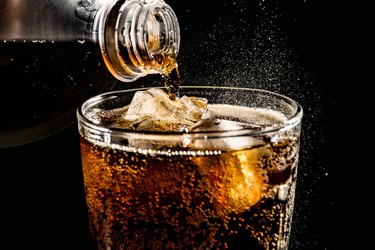
When we're trying to lose weight, we often obsess over what we're eating but forget that what we're drinking counts, too.
In fact, American adults drink about 340 calories on average per day, according to a November 2017 study published in Obesity. That means the number of calories we drink in one week is nearly 2,400, which is more than the daily recommended calorie intake for most adults. Put another way: An entire day's worth of our weekly calories is taken up just by the calories in drinks.
Video of the Day
Video of the Day
Soda, coffee and tea (with added sugar or creamer), juice, milk and alcohol constitute the majority of the calories we're sipping on. But that doesn't mean you need to swear off all drinks that aren't water forever; some beverages can actually support your weight-loss goals.
The 5 Best Drinks When You're Trying to Lose Weight
1. Water
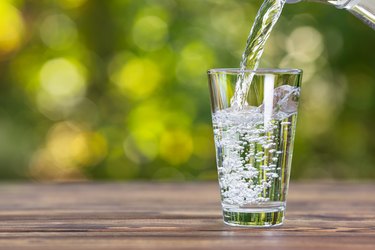
Calories (per cup): 0
No big surprise here. Good old H2O is certainly one of the best drink options, especially when it comes to staying hydrated and losing weight. Water has zero calories so it's not adding anything to your overall caloric intake.
On top of that, drinking water before a meal may lead to eating less, according to an older February 2010 study published in Obesity. In the clinical study, subjects were put on a hypocaloric diet and then split into two groups: One group drank 2 cups of water before each meal and the other group did not. After 12 weeks, the group that consumed H20 prior to eating lost about 4.5 pounds more than the other group. Their calorie intake at each meal was lower.
Related Reading
2. Coffee

Calories (per cup): 2
It's true, coffee is nearly free of any calories, which makes it a smart sip if you're trying to lose weight. But this is for black coffee, which has 2 calories per cup, according to the USDA — not your favorite cup of joe with added sweetener and/or creamers. That said, if you incorporate the healthier add-ins, coffee may still help, not hinder, your weight-loss goals.
But does coffee itself promote weight loss? The research is mixed. There are studies, like this clinical trial, published in December 2019 in the American Journal of Clinical Nutrition, which found that after 24 weeks, drinking 4 cups of coffee per day led to greater fat loss compared to not drinking coffee. Trouble is, 4 cups of coffee likely pushes beyond your daily caffeine limit.
In addition, other studies point to the ways coffee may hinder weight loss. Caffeine may mess with the way we taste sweetness — making beverages taste less sweet than they really are, according to an August 2017 study published in the Journal of Food Science. Plus, if you drink caffeinated coffee later in the day, it can mess with your sleep cycle, which we know affects our weight.
Related Reading
3. Green Tea
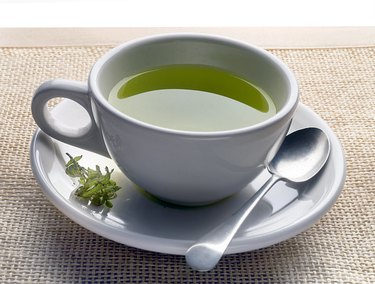
Calories (per cup): 0
Like water and coffee, unsweetened green tea is low in calories making it a healthy, weight-loss-friendly beverage to sip on — in fact, one cup of green tea has zero calories, per the USDA. And, it can certainly help you lose weight if you're swapping for other sweetened beverages like soda or coffee with scoops of sugar.
But does green tea have any added benefits when it comes to weight loss? There's research to show it may have a modest effect on your weight. After 8 weeks, people who drank 4 cups of green tea or a green tea extract each day lost significantly more weight than those who just sipped on water, per a small February 2010 study published in the Journal of the American College of Nutrition.
On the other hand, there's research showing it has no significant impact on your weight, per Harvard Health Publishing. That said, green tea has many proven health benefits so sipping on it may improve your health, regardless of weight loss.
Related Reading
4. Lemon Water
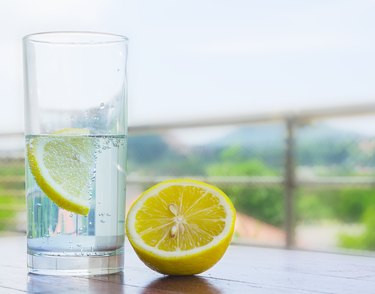
Calories (per cup): 0
If adding lemon to your water helps you drink more, then you're more apt to stay hydrated, which may help you eat less since we know feeling hungry can mimic the symptoms of dehydration. The same goes for sparkling water without added sugars. It may help manage your weight if it helps you stay hydrated.
But does adding lemon to water give it any special weight-loss powers? Not so much. The polyphenols in lemon may help reduce hunger, per preliminary research study published in Food & Function in July 2018. The body of science in this area isn't compelling enough, however. More research needs to be done.
5. Protein Shakes
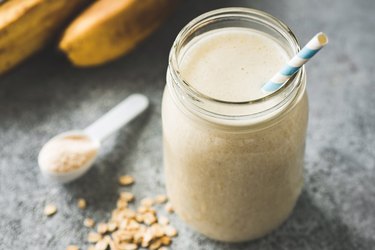
Calories (per cup): ~150 calories
Protein shakes are often marketed for weight loss, but do they work? It depends. Research consistently shows that protein is crucial when it comes to losing weight. Weight-loss diets higher in protein lead to great weight and fat loss, as well as greater preservation of lean mass, according to a July 2015 review article published in the American Journal of Clinical Nutrition.
Protein also leads to an increase in perceived fullness and elevated satiety hormones.
So, having adequate protein intake throughout the day can be helpful when trying to lose weight, making protein shakes a smart choice if you're in a pinch. But you don't want to rely too heavily on them because eating real, whole food sources of protein will better serve you. Also, you want to avoid protein drinks with tons of added sugars or artificial sweeteners or colors.
Related Reading
2 Drinks to Avoid if You’re Trying to Lose Weight
There are also beverage products marketed as helping you lose or manage your weight that are best kept at an arm's length.
1. Diet Soda
Yes, diet soda is calorie-free but that doesn't necessarily mean it should be part of your weight-loss plan. More than a third of the beverages we consume contain low-calorie sweeteners, according to a study from the American Heart Association, published in August 2018 in Circulation. While these types of beverages may help control your intake, there is significant evidence pointing to the adverse effects they may have on your health, per the study.
Additionally, the science on whether these artificial sweeteners can help with weight loss is mixed. Some health experts suggests that they may decrease your sensitivity to sweetness. About 20 percent of adults who are overweight, and 20 percent of adults with obesity, drink diet beverages, per a March 2014 study published in the American Journal of Public Health — note that this is an observational study, meaning it cannot determine cause and effect.
Related Reading
2. Master Cleanse
The Master Cleanse, also known as the lemonade diet, is more than just drinking a beverage, it's a total cleanse. You will absolutely lose weight on this 10-day (at minimum) journey, if you're able to sustain it, since you're only consuming the proprietary drink which includes lemon, water, cayenne and maple syrup, and has 19 calories per cup, according to the USDA. But like any gimmicky fad diet, it will eventually run its course, and you'll return to old eating habits, gaining back any weight loss.
- Obesity: "Trends in Beverage Consumption Among Children and Adults, 2003‐2014"
- Obesity: "Water Consumption Increases Weight Loss During a Hypocaloric Diet Intervention in Middle‐aged and Older Adults"
- USDA: "Coffee"
- American Journal of Clinical Nutrition: "The Effect of Coffee Consumption on Insulin Sensitivity and Other Biological Risk Factors for Type 2 Diabetes: A Randomized Placebo-controlled Trial"
- Journal of Food Science: "Caffeine May Reduce Perceived Sweet Taste in Humans, Supporting Evidence That Adenosine Receptors Modulate Taste"
- Harvard Health Publishing: "Tea"
- Food & Function: "Hibiscus and Lemon Verbena Polyphenols Modulate Appetite-Related Biomarkers in Overweight Subjects: A Randomized Controlled Trial"
- USDA: "Green Tea"
- American Journal of Clinical Nutrition: "The Role of Protein in Weight Loss and Maintenance"
- Circulation: "Diet-Beverage Consumption and Caloric Intake Among US Adults, Overall and by Body Weight"
- Circulation: "Low-Calorie Sweetened Beverages and Cardiometabolic Health: A Science Advisory From the American Heart Association"
- USDA: "Organic Master Cleanse Superade"
- USDA: "Protein Shakes"